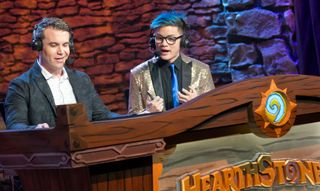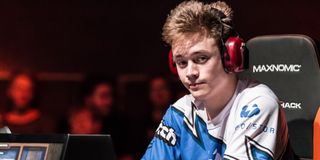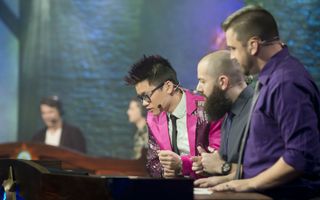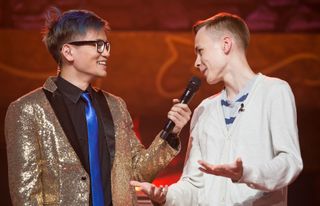The making of Frodan: Who needs RNG when you work this hard?
We hung out with the voice of Hearthstone at the Summer Finals and discovered he could have gone into politics instead of casting.

Frodan is exhausted. The late-afternoon Pacific sun bathes the Ikeas and Targets of Burbank in a lush apricot glow—the sort of thing that makes even most unremarkable corners of Los Angeles look postcard-worthy. We've both spent our weekend in the tangled corridors of the newly-opened Blizzard Arena for the Hearthstone Championship Tour’s Summer Finals, the final stop before Worlds. Which means Frodan is perpetually on-call: either as one-half of Hearthstone’s marquee broadcast team with Brian Kibler or as the impish MC handling player interviews on the main stage.
It’s a demanding gig, especially on a Saturday like today where every match is stretching into a nervy, sudden-death fifth game. By my count Frodan is on hour number 10, and in desperate need of a break. He removes his gold-spangled blazer and sinks into a plush armchair waiting in an otherwise empty corner lounge. "People think I have it really put together," he says. "I’m in my mid-20s, I’m still learning like everyone else."
In order: Dan "Frodan" Chou is a tournament organizer, a manager for Tempo Storm’s Hearthstone division, and a full-time Twitch employee, but he made his name as the smooth-talking voice guiding the Hearthstone analyst desk. Chou is a natural; funny, insightful, and seemingly always even-keeled. For broadcasts he's outfitted in Willy Wonka-style suits, snug jeans, and perfectly-prismatic hair. He says he dresses that way out of either a deep-seated confidence or a lack of shame, (can’t decide which), and to remind the other players and casters around him that, at the end of the day, they’re all here to talk about a card game. It should be fun not stressful. "The first time I dressed this way I was so afraid of looking like an idiot," he recalls. "But now I’m in so deep that I can’t even hear those voices."

There are Hearthstone celebrities like Kripparrian and Trump who’ve cultivated huge followings through endless arena runs and a relentless streaming schedule. There are Hearthstone pros like Pavel and Purple who’ve earned the respect of their peers through almost unbelievable competitive consistency and putting in marathon practice sessions with other pros. Frodan is neither. He streams irregularly and has no daily schedule, and though he's capable of finishing in the top 100 on ladder he has no tournament wins to his name.
None of which has stopped him from emerging as perhaps the most beloved, recognizable figure in Hearthstone's still young esports scene. As a broadcaster Chou is cheeky and suave, with the slight dash of acerbic wit necessary to give Hearthstone’s endless bad beats and righteous draws their character. It’s is a good place to be. And yet, he’s not quite satisfied. "If I just casted, and did only that, I think I’d get bored and kinda sad after a while. I wanna do more things," says Frodan. "So many people who do commentary—over the years, they move onto other projects, largely because they realize that there’s a lot more to explore with your influence than just yelling GG."
Sister act
Chou was a shy kid, or at least shyer than his sister, who was seven years his senior. "She was doing magic shows, puppet shows, and public speaking way before I was," he remembers, "I looked up to her a lot... I kinda wanted to be my sister." They grew up together in the frigid meadows of East Brunswick, New Jersey, and it was her who first nicknamed him Frodan. He kept that alias around as a permanent reminder of her affection.
The Frodan persona, as much as there is one, started to coalesce during his varsity years. Chou describes himself as a very civically engaged teenager. In high school he discovered a passion for political action, and became a strong, idealistic proponent for youth engagement. He got his hands dirty as a coordinator for political rallies and demonstrations, he was in a debate club, he was playing in a band at his local church, and most boldly, at 19 he ran for office as a county freeholder. Yes, Frodan, the waggish Hearthstone caster, once went door-to-door in Alameda County. He tells me he wanted to bring youth to local policy, which reflects his belief that local government should be accessible for anyone, regardless of age. Naturally, Chou was the youngest person campaigning by about 20 years.
The biggest gaming news, reviews and hardware deals
Keep up to date with the most important stories and the best deals, as picked by the PC Gamer team.
"When I knocked on doors and asked people to vote for me and petition for things, they would always think I was doing it as a boy scout or that I lead a scout troop," he laughs. "I’d be like, 'No I’m actually campaigning for me! I hope you vote for me.’ It was always such a trip ... Old people couldn’t believe that someone that much younger could be trusted with such important decisions like park policy or garbage dumps."
Every other weekend he’d hit the road and set up shop at a local LAN. His casting fee was a slice of pizza.
Back in those days Frodan was considering turning his activism experience into a career in politics, because it’d be the best way to "constitute change and influence." Unfortunately, he soon found that all the back-biting and horse-trading involved—even at the provincial level—killed those dreams dead. "There’s so much pettiness. You feel like it’s such a waste of your energy," he says. "I got out pretty quickly when I started going to University full-time." Still, Frodan maintains that the foundations he laid in high school have paid dividends throughout his pro gaming career. He has always been willing to go big, with almost no guarantee that the hard work would pay off. In terms of the personal gamble involved, esports and politics have something in common.
Technically speaking, college was the first time Frodan could call himself an "esports professional," in the sense that he organized an online StarCraft derby from his college dorm for about $100. That was in 2010, at a time when Chou was considering law school and the idea of of professional gaming had been all but dead for a decade. Every other weekend he’d hit the road and set up shop at a local LAN. His casting fee was a slice of pizza, maybe two, which was enough to justify the class hours he was cutting to be there.

“Dan has that genuine love of esports that built the industry from the ground up. It is his passion, and nothing was going to stop him from pursuing it,” says Andrey “Reynad” Yanyuk, CEO of Tempo Storm and a friend of Chou. The two were even housemates for a while. “He's a consummate professional that's always trying to help the people around him be the best version of themselves.”
Three months ago, Frodan was the lynchpin of Blizzard's broadcast of the spring seasonal from Shanghai, and in January next year he’ll be christening Worlds in Amsterdam. And yet, he still regards those ultra-DIY years as some of the best of his life. "Right now I’m living the dream, but it’s a combination of fun and stress. Back then I was really naive. I loved everything," he says. "I barely made enough money to pay my rent, food, and gas, I didn’t have any kind of insurance or bank account. But I was so happy."
Change and influence
StarCraft was where Frodan initially made his name—by 2012 he was reliably making a living talking over Zerg swarms—but Hearthstone has made him a star. He was ubiquitous during the game’s explosive rise to the top of Twitch's directory; the lead caster at the short-lived (and radically mismanaged) ESGN, one of the voices behind the game’s first formal World Championship in 2014, and of course, he called the epic, one-night-only rematch between Kripparrian and Artosis, which remains perhaps the most beloved Hearthstone tournament moment of all time. As competitive games go, none is more meme-y than Hearthstone, and Frodan knows his audience better than anyone.

As viewers we are attracted to Chou’s effortless charisma, which rapidly breaks down any friction or awkwardness between strangers. We appreciate how his love for Hearthstone seems so unforced, and evidenced by his enthusiasm when the board presents a tricky puzzle to solve. But most of all, we respect his candidness, and his refusal to blow smoke up Blizzard's back side just because the company endorses some of his checks.
There are so many examples. Most recently, he called out Hearthstone for its sub-par new-player experience, tweeting out an Evolve Shaman decklist with more than half of the card slots greyed-out by gaps in his collection from his free-to-play account.
Started a F2P Asia acct since Un'Goro, never missed dailies/TBs. Saw a cool variant of my fav deck...this is how much of it i can afford lol pic.twitter.com/ttkQC78iFeOctober 5, 2017
In February, during the dog days of the disastrous Mean Streets of Gadgetzan meta that came to be dubbed 'Shamanstone', Chou gave an exasperated interview with Yahoo, stating plainly, "right now, we’re at a deep crosswords within the community. A lot of the hardcore players are leaving, they feel like Hearthstone has a lot of potential, but it’s not meeting what they want." A few months before that, as part of his One Night in Karazhan set review, which was recorded a few days after he revealed the two-mana Priest spell Purify live on-stream and set Reddit ablaze, he admitted: "I do think it’s kind of insulting that the card exists."
Candour is nothing new. There are plenty of Hearthstone pros who are more than happy to bellyache about the inconsistency of the meta, the HCT format, or the bare-bones ladder system—but it carries more weight, and comes with greater personal risk, when the criticisms are coming from the guy who's effectively regarded as the voice of the game by many fans.
Frodan tells me several players blocked him on Twitter, and more "still talk very negatively about me to this day."
Frodan understands this. He knows he’s in a position where a lot of people take what he has to say very seriously. It’s a reality that dawned on him last summer, when he got in a brief Twitter spat with a notable Hearthstone pro named Radu "RDU" Dima. In summary: RDU noted that Korean pro Ilmook "Handsomeguy" Kang had a leg up in tournaments due to the Asia region’s weird qualification rules. Frodan responded by criticizing RDU, saying he was demeaning another player’s accomplishments because he was upset about his own shortcomings. "I get that you're salty because you grinded hard, but you should be happy for someone else who worked super hard and plays well," he wrote in his first retort.
It didn’t seem like a huge deal, (at least from the outside looking in,) but that incident burned bridges. Frodan tells me several players blocked him on Twitter, and more "still talk very negatively about me to this day." For the first time, Chou realized he was no longer an upstart caster clawing his way to relevancy, nor could he make the excuse that he was just some guy who loved games. Frodan was finally on the kind of platform he’d spent a career chasing, and that meant everyone was watching, all the time. "I didn’t realize that saying something I thought was kinda light was a big deal for a lot of people," he says. "They pointed out that, 'you’re a big role-model man, you can’t just let loose.’"

From now on, Frodan intends to use his authority for good. To "constitute change and influence," you might say. It might seem strange to apply the principles learned at political rallies to the proverbial children’s card game, but Frodan loves Hearthstone while at the same time fearing for his future. He wants to see the competitive scene thrive. One of his passion projects? A junior division, in which kids 15-and-under have an opportunity to compete under the same lights as the pro players. Anything to grow the esport.
That’s what sets Frodan apart. He's in one of the most enviable positions in the industry, but he won’t feel fulfilled unless he’s lifting the rest of the scene up with him. He’s happy to get rich, as long as Hearthstone stays healthy. "I think ultimately, that’s why I can and do come out and say some harsh things about Blizzard, because they know I come from a position of caring," he says. "Historically, I’ve given as much as I think I’ve taken."
Frodan will continue to cast, and he will continue to dream big. He’s spent a life believing that good things come from old-fashioned ideals like conviction, dedication, and the radical power of youth. Somehow, a card game has proven him right.

Luke Winkie is a freelance journalist and contributor to many publications, including PC Gamer, The New York Times, Gawker, Slate, and Mel Magazine. In between bouts of writing about Hearthstone, World of Warcraft and Twitch culture here on PC Gamer, Luke also publishes the newsletter On Posting. As a self-described "chronic poster," Luke has "spent hours deep-scrolling through surreptitious Likes tabs to uncover the root of intra-publication beef and broken down quote-tweet animosity like it’s Super Bowl tape." When he graduated from journalism school, he had no idea how bad it was going to get.
Most Popular

